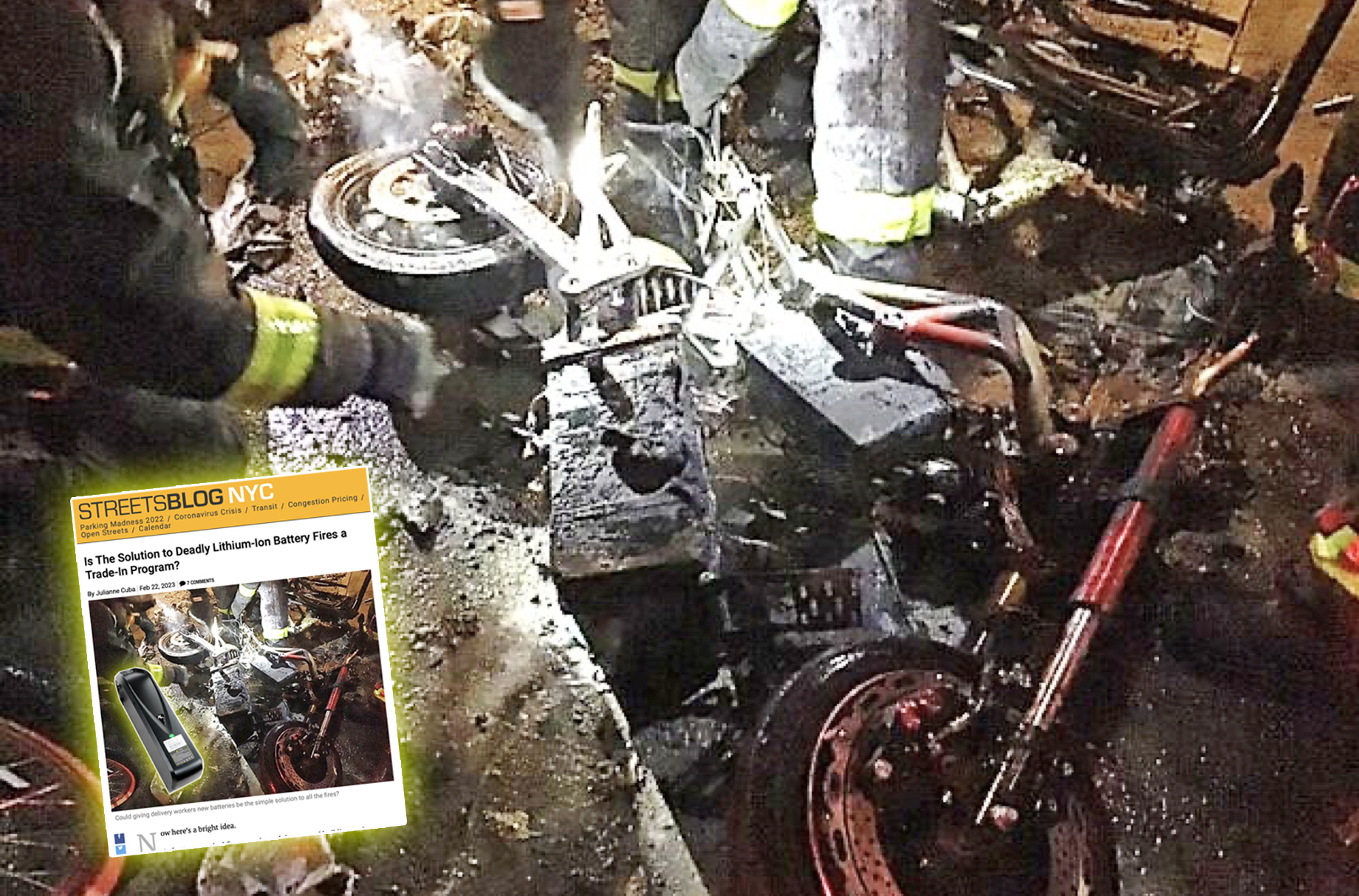They’re trying to light a fire under the apps.
The City Council on Thursday rubber-stamped a bill to create a citywide "buy back" program that would allow delivery workers to exchange faulty or second-hand lithium-ion batteries for safe, certified ones — and a trio of pols also introduced a slate of other reforms to do even more to rein in the rogue industry after a spate of deadly fires.
“We know there are folks who can't afford high-priced batteries and bikes, and we will provide them the opportunity to surrender that unsafe equipment and receive a safe replacement,” Council Member Keith Powers said, likening the program to successful efforts to get guns off the streets.
A big thank you @KeithPowersNYC for your partnership with @LosDeliveristas and leadership for making the first trade-in program possible for #Deliveristas like myself.
— gustavo ajche (@AjcheGustavo) September 14, 2023
This is a historic step to help app delivery workers and our city transition to a safer and accessible e-micro… pic.twitter.com/WA3aZDQ8Pb
Powers introduced the trade-in program bill in March, after Streetsblog reported on the idea dreamed up by advocates. Initially proposed as just a battery swap, the legislation was later amended to include batteries and powered mobility devices, such as electric scooters and electric bicycles. Certified batteries can cost up to nearly $1,000, making it difficult for delivery workers — who take home just $7.09 per hour on average, excluding tips — to afford them.
The two-year program, which would be funded by the city, doesn’t yet come with a price tag. And it’s not yet clear who would qualify for free or subsidized equipment — a detail that will be figured out as part of the rule-making process, according to Powers.
Creating the buy-back program is a big step — especially after some initial trepidation from Mayor Adams regarding its "cost factor"— but it’s only a small part of solving a growing crisis. So far this year, there have been 180 fires attributed to lithium-ion batteries, killing 14 people and injuring more than 100 more, according to the FDNY.
Powers wants delivery companies — who employee tens of thousands of low-paid workers as independent contractors so that the workers have to pay for their own equipment and health care — to step up to the plate.
“Ultimately we do believe the crisis is going to fall on the delivery companies to help to create safer standards,” said Powers, adding that the battery buy-back is something of a first step.
"We have to acknowledge that right here, right now, there is unsafe equipment on the streets and we need to get it off the streets," he said.
In that vein, Bronx Council Member Oswald Feliz introduced legislation requiring that all deliveries be made on safe bikes and batteries, while Manhattan Council Member Gale Brewer introduced a bill that would require those same apps — including Uber, Grubhub, DoorDash, and Relay — to provide their workers with safety training and equipment.
Feliz said it's long past time for the delivery app companies to "play a role in helping us resolve the fire-safety challenges ... by ensuring their workers have access to safe access equipment."
Brewer, who also put forward a resolution calling on the city to support several e-bike and battery regulation bills in the state legislature, demanded that the app companies take responsibility for their workers’ safety and livelihoods, and that the Department of Transportation update its existing commercial bicycle safety course to include "safe and lawful operation of e-bikes and mopeds," as well as safe charging practices for lithium-ion batteries.
“The responsibility to fix the lithium-ion battery problem can’t fall on FDNY alone. App companies are still shirking responsibility and DOT has fallen behind,” she said. "My bill will make sure the situation changes."
Amid the urgency of the lithium-ion battery fire crisis, the Council has moved aggressively and quickly by historic standards. The slate of bills and resolutions on Thursday follows another package that passed in March, including intro. 663, introduced by Feliz, which would prohibit the sale of uncertified batteries or those not approved by reputable organizations such as Underwriters Laboratory. Enforcement of that bill is slated to begin on Saturday, the effective date of the law.
A rep for DoorDash called the city-funded trade-in program a “positive step forward,” but declined to comment on the proposed requirement to ensure their workers are making deliveries on safe bikes. A spokesperson for Grubhub said the company is “open to exploring any reasonable ways that delivery platforms can be a part of the solution.” And reps for Uber and Relay did not immediate responded to requests for comment.






